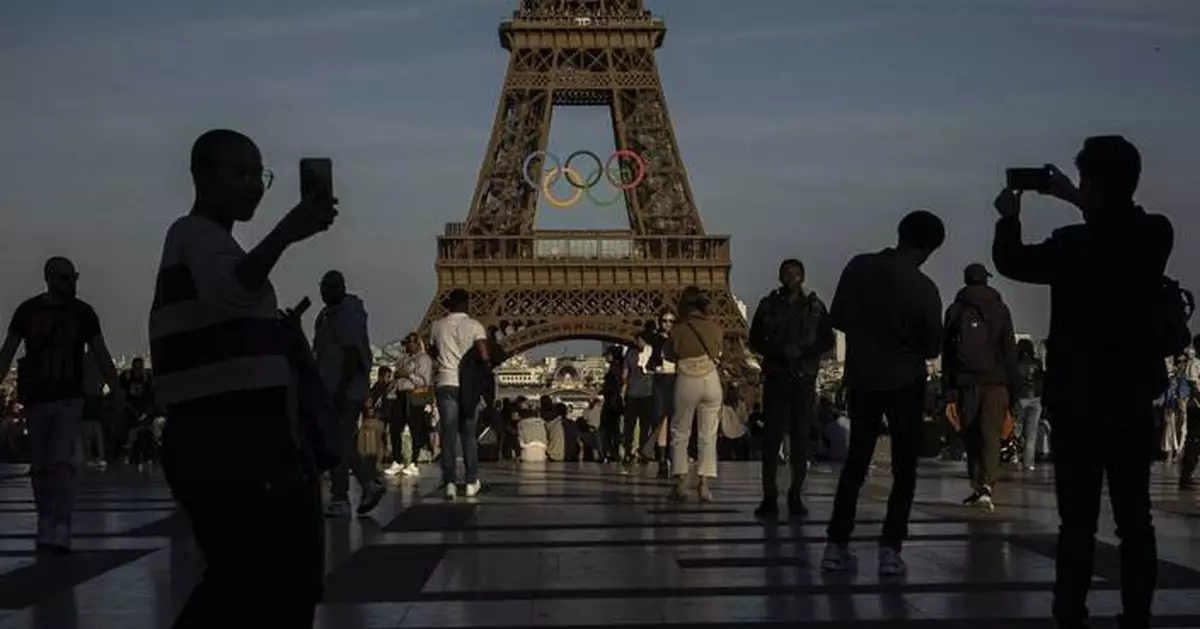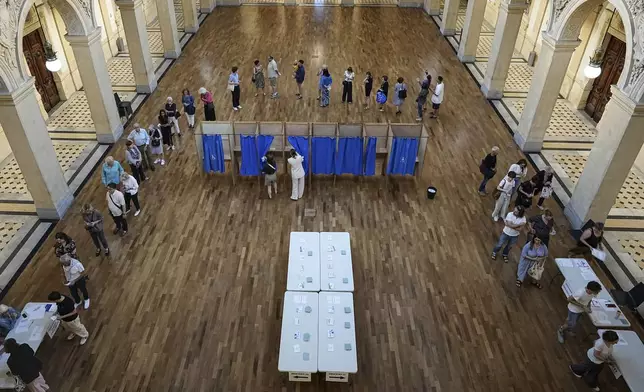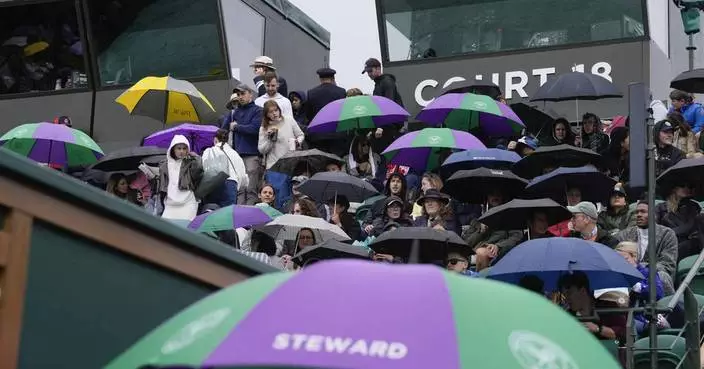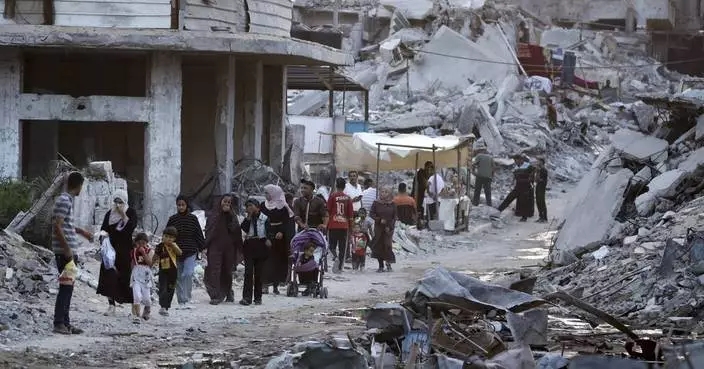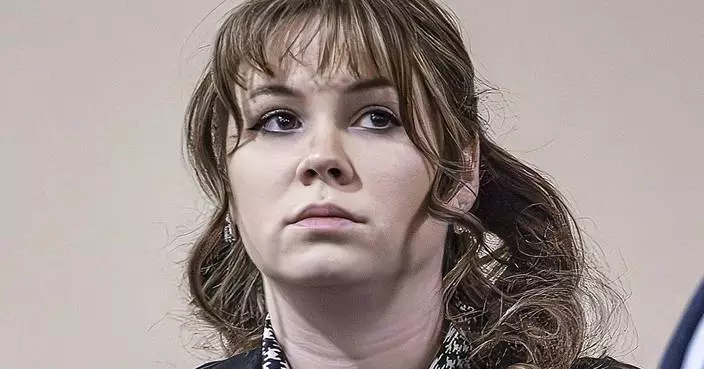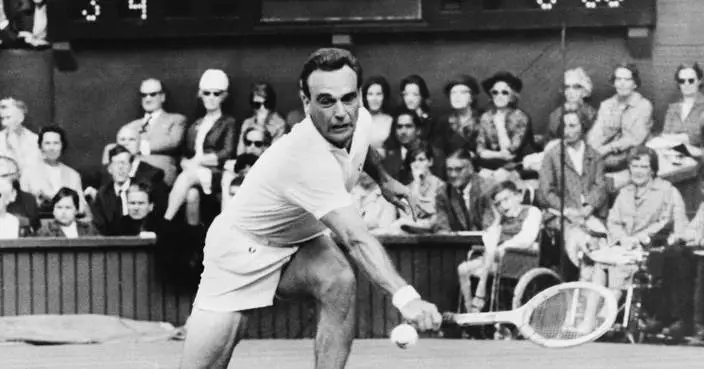PARIS (AP) — Photos of blood-red hands on a Holocaust memorial. Caskets at the Eiffel Tower. A fake French military recruitment drive calling for soldiers in Ukraine, and major French news sites improbably registered in an obscure Pacific territory, population 15,000.
All are part of disinformation campaigns orchestrated out of Russia and targeting France, according to French officials and cybersecurity experts in Europe and the United States. France’s legislative elections and the Paris Olympics sent them into overdrive.
Click to Gallery
FILE - Russian President Vladimir Putin, right, shakes hands with French far-right presidential candidate Marine Le Pen, in the Kremlin in Moscow, Russia, Friday, March 24, 2017. On June 9, the French far-right National Rally trounced Macron’s party in elections for the European Parliament. The party has historically been close to Russia: one of its leading figures, Marine Le Pen, cultivated ties to Putin for many years and supported Russia’s illegal annexation of Crimea from Ukraine in 2014. (Mikhail Klimentyev, Sputnik, Kremlin Pool Photo via AP, File)
PARIS (AP) — Photos of blood-red hands on a Holocaust memorial. Caskets at the Eiffel Tower. A fake French military recruitment drive calling for soldiers in Ukraine, and major French news sites improbably registered in an obscure Pacific territory, population 15,000.
FILE - A man walks by Stars of David tagged on a wall in Paris, on Oct. 31, 2023. France says it has been the target of a Russian online destabilization campaign that used bots to whip up controversy and confusion about spray-painted Stars of David that appeared on Paris streets. French government officials accused Russia of operating a long-running online manipulation campaign against Ukraine's Western backers. (AP Photo/Michel Euler, File)
FILE - Far-right National Rally party president Jordan Bardella delivers his speech after the first round vote of the legislative election in Paris, Sunday, June 30, 2024. Bardella has said he opposes sending long-range weapons to Kyiv. (AP Photo/Aurelien Morissard, File)
FILE - Russian President Vladimir Putin, right, shakes hands with French far-right presidential candidate Marine Le Pen, in the Kremlin in Moscow, Russia, Friday, March 24, 2017. On June 9, the French far-right National Rally trounced Macron’s party in elections for the European Parliament. The party has historically been close to Russia: one of its leading figures, Marine Le Pen, cultivated ties to Putin for many years and supported Russia’s illegal annexation of Crimea from Ukraine in 2014. (Mikhail Klimentyev, Sputnik, Kremlin Pool Photo via AP, File)
FILE - Voters wait at a polling station to vote in the first round of the French parliamentary election, in Lyon, central France, Sunday, June 30, 2024. Voters across mainland France are casting ballots in the first round of an exceptional parliamentary election. Cybersecurity experts and French officials say Russian disinformation campaigns against France are zeroing in on legislative elections and the Olympic Games which open in Paris at the end of the month. (AP Photo/Laurent Cipriani, File)
FILE - People use their smartphones near the Olympic rings that are displayed on the Eiffel Tower in Paris, June 7, 2024 in Paris. Cybersecurity experts and French officials say Russian disinformation campaigns against France are zeroing in on legislative elections and the Olympic Games which open in Paris at the end of the month. (AP Photo/Aurelien Morissard, File)
More than a dozen reports issued in the past year point to an intensifying effort from Russia to undermine France, particularly the upcoming Games, and President Emmanuel Macron, who is one of Ukraine's most vocal supporters in Europe.
This story, supported by the Pulitzer Center for Crisis Reporting, is part of an Associated Press series covering threats to democracy in Europe.
The Russian campaigns sowing anti-French disinformation began online early last summer but first became tangible in October 2023 when more than 1,000 bots linked to Russia relayed photos of graffitied Stars of David in Paris and its suburbs.
A French intelligence report said the Russian intelligence agency FSB ordered the tagging, as well as subsequent vandalism of a memorial to those who helped rescue Jews from the Holocaust.
Photos from each event were amplified on social media by fake accounts linked to the Russian disinformation site RRN, according to cybersecurity experts. Russia denies any such campaigns. The French intelligence report says RRN is part of a larger operation orchestrated by Sergei Kiriyenko, a ranking Kremlin official.
“You have to see this as an ecosystem,” said a French military official, who spoke on condition of anonymity to reveal information about the Russian effort. “It’s a hybrid strategy.”
The tags and the vandalism had no direct link to Russia's war in Ukraine, but they provoked a strong reaction from the French political class, with denunciations in the legislature and public debate. Antisemitic attacks are on the rise in France, and the war in Gaza has proven divisive.
The Stars of David could be interpreted either as support for Israel or as opposition. The effect was to sow division and unease. French Jews in particular have found themselves unwittingly thrust into the political fray despite, at just 500,000 people, making up a small proportion of the French population.
In March, just after Macron discussed the possibility of mobilizing the French military in Ukraine, a fake recruitment drive went up for the French army in Ukraine, spawning a series of posts in Russian- and French-language Telegram channels that got picked up in Russian and Belarusian media, according to a separate French government report seen by The Associated Press. On June 1, caskets appeared outside the Eiffel Tower, bearing the inscription “French soldiers in Ukraine.”
The larger disinformation efforts show little traction in France, but the Russian audience may have been the real target, officials said, by showing that Russia’s war in Ukraine is, as Putin has said, really a war with the West.
Among the broader goals, the French military official said, was a long-term and steady effort to sow social discord, erode faith in the media and democratic governments, undermine NATO, and sap Western support for Ukraine. Denigrating the Olympics, from which most Russian athletes are banned, is a bonus, according to French officials monitoring the increasingly strident posts warning of imminent unrest ahead of the Games.
On June 9, the French far-right National Rally trounced Macron’s party in elections for the European Parliament. The party has historically been close to Russia: one of its leading figures, Marine Le Pen, cultivated ties to Putin for many years and supported Russia’s illegal annexation of Crimea from Ukraine in 2014. And its leading contender for prime minister, Jordan Bardella, has said he opposes sending long-range weapons to Kyiv.
In more than 4,400 posts gathered since mid-November by antibot4navalny, a collective that analyzes Russian bot behavior, those targeting audiences in France and Germany predominated. The number of weekly posts ranged from 100 to 200 except for the week of May 5, when it dropped near zero, the data showed. That week, as it happens, was a holiday in Russia.
Many of the posts redirect either to RRN or to sites that appear identical to major French media, but with the domain – and content – changed. At least two of the more recent mirrored sites are registered in Wallis and Futuna, a French Pacific territory 10 time zones from Paris. A click on the top of the fake page redirects back to the real news sites themselves to give the impression of authenticity. Other posts redirect to original sites controlled by the the campaign itself, dubbed Doppelganger.
The redirects shifted focus for the European elections and continued after Macron called the surprise legislative elections with just three weeks to spare. Three-quarters of posts from the week ahead of the June 30 first-round legislative vote that were directed toward a French audience focused on either criticizing Macron or boosting the National Rally, antibot4navalny found in data shared with The Associated Press.
One post on a fake site purported to be from Le Point, a current affairs magazine, and the French news agency AFP, criticizing Macron.
“Our leaders have no idea how ordinary French people live but are ready to destroy France in the name of aid for Ukraine,” read the headline on June 25.
Another site falsely claimed to be from Macron’s party, offering to pay 100 euros for a vote for him – and linking back to the party's true website. And still another inadvertently left a generative AI prompt calling for the re-write of an article “taking a conservative stance against the liberal policies of the Macron administration,” according to findings last week from Insikt Group, the threat research division of the cybersecurity consultancy Recorded Future.
“They’re scraping automatically, sending the text to the AI and asking the AI to introduce bias or slants into the article and rewrite it,” said Clément Briens, an analyst for Recorded Future.
Briens said metrics tools embedded within the site are likely intended to prove that the campaigns were money well-spent for “whoever is doing the payouts for these operations.”
The French government cybersecurity watchdog, Viginum, has published multiple reports since June 2023 singling out Russian efforts to sow divisions in France and elsewhere. That was around the time that pro-Kremlin Telegram feeds started promoting “Olympics has Fallen” — a full-length fake Netflix film featuring an AI-generated voice resembling Tom Cruise that criticized the International Olympic Committee, according to the Microsoft Threat Analysis Center.
Microsoft said this campaign, which it dubbed Storm-1679, is fanning fears of violence at the Games and last fall disseminated digitally generated photos referring, among other things, to the attacks on Israeli athletes at the 1972 Olympics.
The latest effort, which started just after the first round of the elections on June 30, merges fears of violence related to both the Olympics and the risk of protests after the decisive second round, antibot4navalny found. Viginum released a new report Tuesday detailing the risks ahead for the Games — not for violence but for disinformation.
“Digital information manipulation campaigns have become a veritable instrument of destabilization of democracies,” Viginum said. “This global event will give untold informational exposure to malevolant foreign actors.” The word Russia appears nowhere.
Baptiste Robert, a French cybersecurity expert who ran unsuccessfully as an unaffiliated centrist in the legislative elections, called on his government – and especially lawmakers – to prepare for the digital threats to come.
“This is a global policy of Russia: They really want to push people into the extremes,” he said before the first-round vote. “It’s working perfectly right now.”
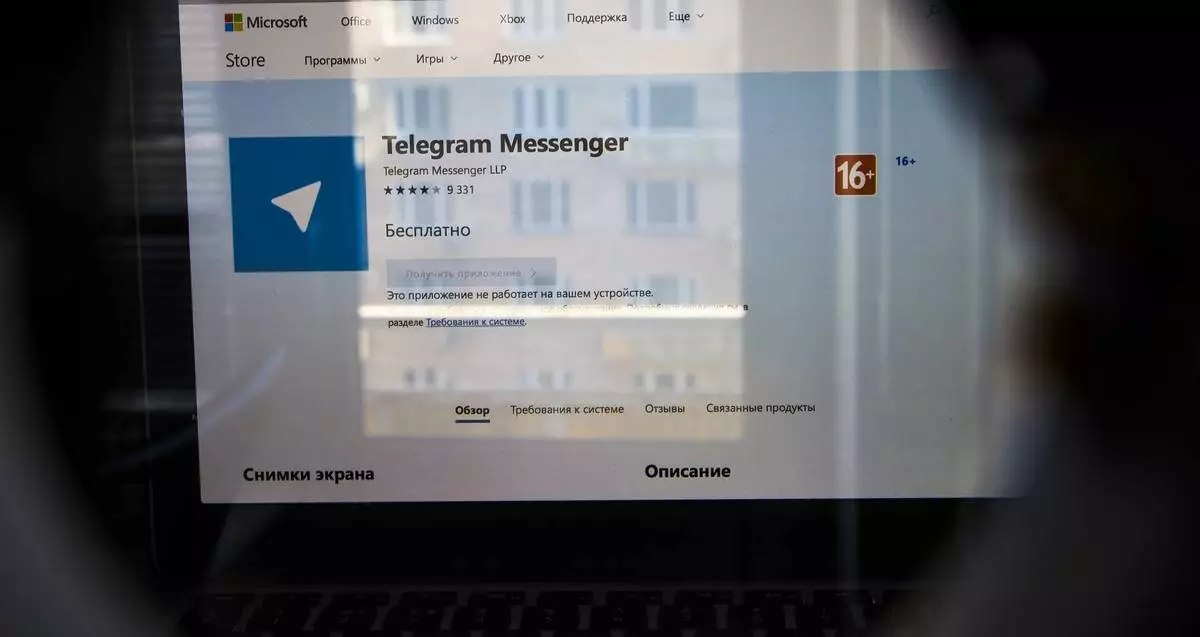
FILE - The website of the Telegram messaging app is seen on a computer's screen in Moscow, Russia, Friday, April 13, 2018. Cybersecurity experts and French officials say Russian disinformation campaigns against France are zeroing in on legislative elections and the Olympic Games which open in Paris at the end of the month. (AP Photo/Alexander Zemlianichenko, File)

FILE - A man walks by Stars of David tagged on a wall in Paris, on Oct. 31, 2023. France says it has been the target of a Russian online destabilization campaign that used bots to whip up controversy and confusion about spray-painted Stars of David that appeared on Paris streets. French government officials accused Russia of operating a long-running online manipulation campaign against Ukraine's Western backers. (AP Photo/Michel Euler, File)
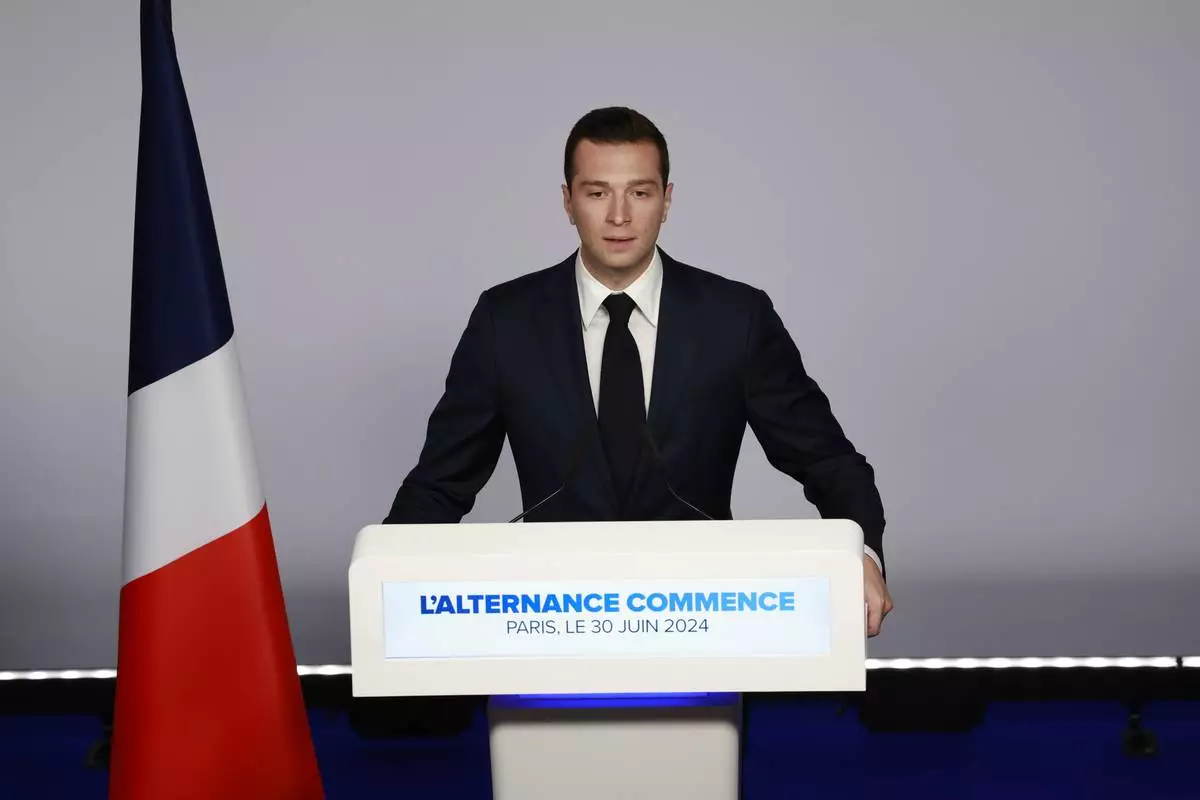
FILE - Far-right National Rally party president Jordan Bardella delivers his speech after the first round vote of the legislative election in Paris, Sunday, June 30, 2024. Bardella has said he opposes sending long-range weapons to Kyiv. (AP Photo/Aurelien Morissard, File)
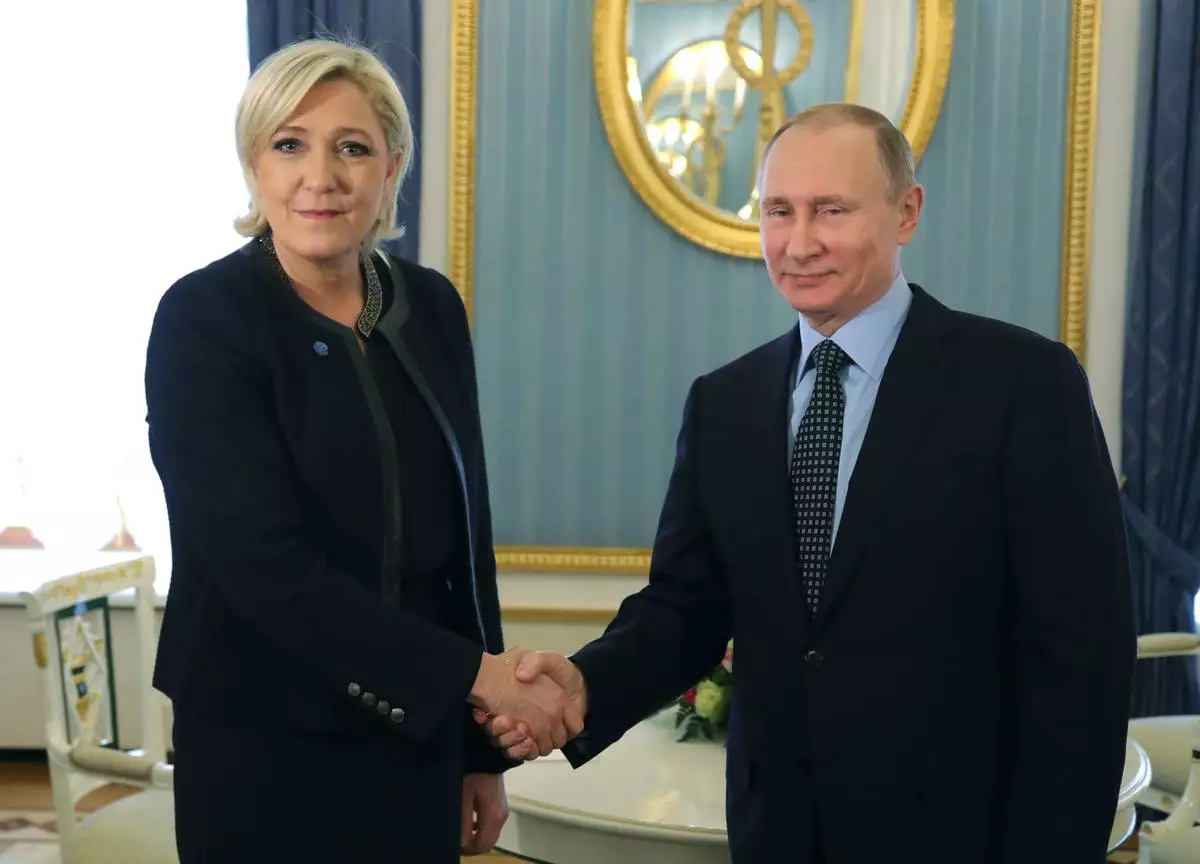
FILE - Russian President Vladimir Putin, right, shakes hands with French far-right presidential candidate Marine Le Pen, in the Kremlin in Moscow, Russia, Friday, March 24, 2017. On June 9, the French far-right National Rally trounced Macron’s party in elections for the European Parliament. The party has historically been close to Russia: one of its leading figures, Marine Le Pen, cultivated ties to Putin for many years and supported Russia’s illegal annexation of Crimea from Ukraine in 2014. (Mikhail Klimentyev, Sputnik, Kremlin Pool Photo via AP, File)

FILE - Voters wait at a polling station to vote in the first round of the French parliamentary election, in Lyon, central France, Sunday, June 30, 2024. Voters across mainland France are casting ballots in the first round of an exceptional parliamentary election. Cybersecurity experts and French officials say Russian disinformation campaigns against France are zeroing in on legislative elections and the Olympic Games which open in Paris at the end of the month. (AP Photo/Laurent Cipriani, File)
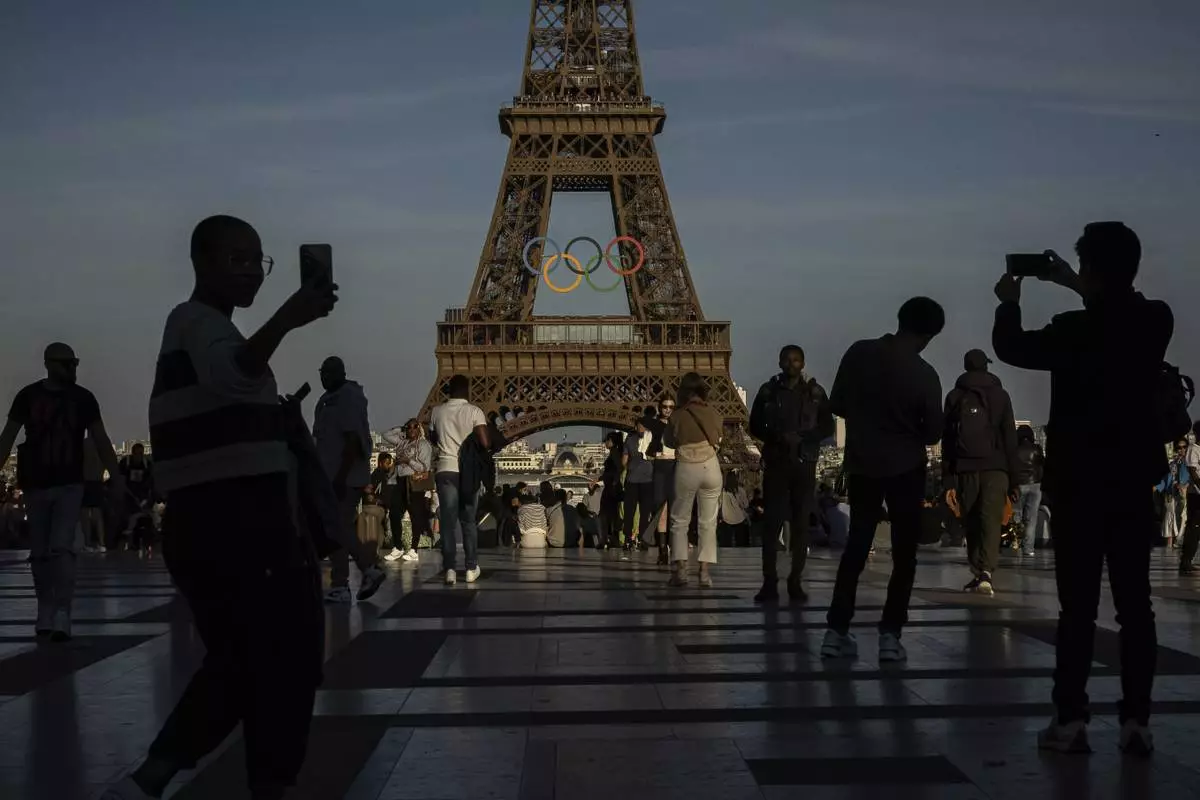
FILE - People use their smartphones near the Olympic rings that are displayed on the Eiffel Tower in Paris, June 7, 2024 in Paris. Cybersecurity experts and French officials say Russian disinformation campaigns against France are zeroing in on legislative elections and the Olympic Games which open in Paris at the end of the month. (AP Photo/Aurelien Morissard, File)
DUBAI, United Arab Emirates (AP) — Reformist candidate Masoud Pezeshkian won Iran’s runoff presidential election Saturday, besting hard-liner Saeed Jalili by promising to reach out to the West and ease enforcement on the country’s mandatory headscarf law after years of sanctions and protests squeezing the Islamic Republic.
Pezeshkian promised no radical changes to Iran’s Shiite theocracy in his campaign and long has held Supreme Leader Ayatollah Ali Khamenei as the final arbiter of all matters of state in the country. But even Pezeshkian’s modest aims will be challenged by an Iranian government still largely held by hard-liners, the ongoing Israel-Hamas war in the Gaza Strip, and Western fears over Tehran enriching uranium to near-weapons-grade levels with enough of a stockpile to produce several nuclear weapons if it chose.
A vote count offered by authorities put Pezeshkian as the winner with 16.3 million votes to Jalili’s 13.5 million in Friday’s election. Overall, Iran's Interior Ministry said 30 million people voted in an election held without internationally recognized monitors, representing a turnout of 49.6% — higher than the historic low of the June 28 first round vote but lower than other presidential races.
Supporters of Pezeshkian, a heart surgeon and longtime lawmaker, entered the streets of Tehran and other cities before dawn to celebrate as his lead grew over Jalili, a hard-line former nuclear negotiator. Pezeshkian later traveled to the mausoleum of the late Grand Ayatollah Ruhollah Khomeini, the leader of the 1979 Islamic Revolution, and addressed journalists in a chaotic event.
“In this election, I didn’t give you false promises. I did not lie,” Pezeshkian said. “It’s been many years after the revolution that we come to the podium, we make promises and we fail to fulfill them. This is the biggest problem we have.”
Pezeshkian's win still sees Iran at a delicate moment, with tensions high in the Mideast and a looming election in the United States that could put any chance of a detente between Tehran and Washington at risk. Pezeshkian's victory also wasn't a rout of Jalili, meaning he'll have to carefully navigate Iran's internal politics as the doctor has never held a sensitive, high-level security post.
Government officials up to Khameni, the supreme leader, predicted higher turnout as voting got underway, with state television airing images of modest lines at some polling centers. However, online videos purported to show some polls empty while a survey of several dozen sites in Tehran saw light traffic and a heavy security presence on the streets.
Authorities counted 607,575 voided votes — which often are a sign of protest by those who feel obligated to cast a ballot but reject both candidates.
Khamenei praised the turnout Saturday despite what he alleged was a boycott campaign “orchestrated by the enemies of the Iranian nation to induce despair and a feeling of hopelessness.”
“I would like to recommend Dr. Pezeshkian, the elected president, put his trust in God, the Compassionate, and set his vision on high, bright horizons,” Khamenei added.
Voters expressed a guarded optimism.
“I don’t expect anything from him — I am happy that the vote put the brake on hard-liners," said bank employee Fatemeh Babaei, who voted for Pezeshkian. "I hope Pezeshkian can return administration to a way in which all people can feel there is a tomorrow.”
Taher Khalili, a Kurdish-origin Iranian who runs a small tailor shop in Tehran, offered another reason to be hopeful while handing out candy to passersby.
“In the end, someone from my hometown and the west of Iran came to power,” Khalili said. "I hope he will make economy better for small businesses.”
Pezeshkian, who speaks Azeri, Farsi and Kurdish, campaigned on outreach to Iran's many ethnicities. He represents the first president from western Iran in decades — something people hope will aid the county as those in the western part are considered more tolerant because of the ethnic and religious diversity in their area.
The election came amid heightened regional tensions. In April, Iran launched its first-ever direct attack on Israel over the war in Gaza, while militia groups armed by Tehran — such as the Lebanese Hezbollah and Yemen’s Houthi rebels — are engaged in the fighting and have escalated their attacks.
While Khamenei remains the final decision-maker on matters of state, Pezeshkian could bend the country’s foreign policy toward either confrontation or collaboration with the West.
Crown Prince Mohammed bin Salman of Saudi Arabia, which has reached a detente with Iran, sent his congratulations to Pezeshkian that stressed his “keenness to develop and deepen the relations that bring our two countries and peoples together.” Russian President Vladimir Putin, who has relied on Iranian-made drones in his war on Ukraine, similarly congratulated Pezeshkian.
Responding to questions from The Associated Press, the State Department called the Iranian election “not free or fair" and noted that “a significant number of Iranians chose not to participate at all.”
“We have no expectation these elections will lead to fundamental change in Iran’s direction or more respect for the human rights of its citizens,” the State Department added. “As the candidates themselves have said, Iranian policy is set by the supreme leader.”
However, it said it would pursue diplomacy “when it advances American interests.”
Candidates repeatedly touched on what would happen if former President Donald Trump, who unilaterally withdrew America from the Iran nuclear deal in 2018, won the November election. Iran has held indirect talks with President Joe Biden's administration, though there's been no clear movement back toward constraining Tehran's nuclear program for the lifting of economic sanctions.
Pezeshkian's win did see Iran's rial strengthen Saturday against the U.S. dollar, trading 603,000 to $1, down from 615,000 on Thursday. The rial traded 32,000 to $1 at the time the 2015 nuclear deal was reached.
Though identifying with reformists and relative moderates within Iran's theocracy during the campaign, Pezeshkian at the same time honored Iran’s paramilitary Revolutionary Guard, on one occasion wearing its uniform to parliament. He repeatedly criticized the United States and praised the Guard for shooting down an American drone in 2019, saying it “delivered a strong punch in the mouth of the Americans and proved to them that our country will not surrender.”
The late President Ebrahim Raisi, whose death in a May helicopter crash sparked the early election, was seen as a protégé of Khamenei and a potential successor as supreme leader.
Still, many knew him for his involvement in the mass executions that Iran conducted in 1988, and for his role in the bloody crackdowns on dissent that followed protests over the 2022 death of Mahsa Amini, a young woman detained by police over allegedly improperly wearing the mandatory headscarf, or hijab.
Vahdat reported from Tehran, Iran. Nasser Karimi in Tehran contributed to this report.

A woman casts her vote for the presidential election in a polling station at the shrine of Saint Saleh in northern Tehran, Iran, Friday, July 5, 2024. Iran held a runoff presidential election on Friday that pitted a hard-line former nuclear negotiator against a reformist lawmaker. (AP Photo/Vahid Salemi)

A woman gets her ballot to vote for the presidential election in a polling station at the shrine of Saint Saleh in northern Tehran, Iran, early Saturday, July 6, 2024. Iran held a runoff presidential election on Friday that pitted a hard-line former nuclear negotiator against a reformist lawmaker. (AP Photo/Vahid Salemi)

A policeman casts his vote for the presidential election in a polling station at the shrine of Saint Saleh in northern Tehran, Iran, Friday, July 5, 2024. Iran held a runoff presidential election on Friday that pitted a hard-line former nuclear negotiator against a reformist lawmaker. (AP Photo/Vahid Salemi)
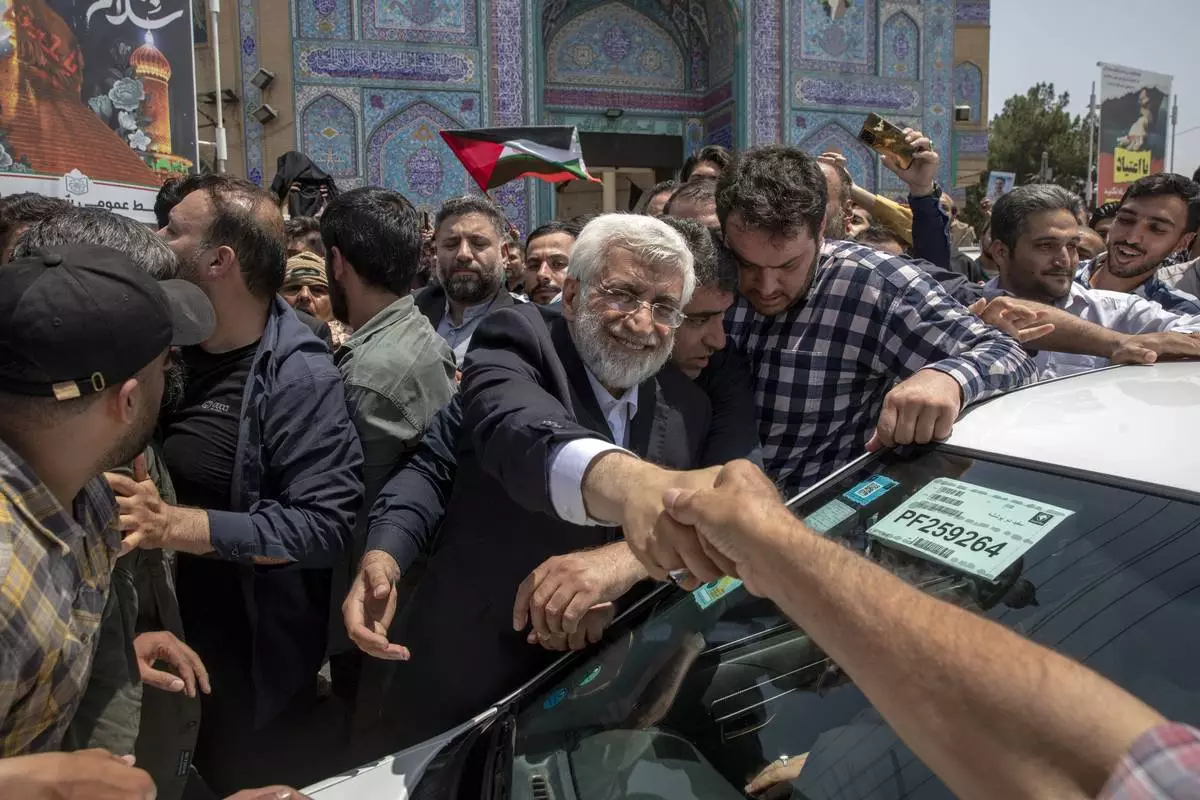
Candidate for the Iran's presidential election Saeed Jalili, a hard-line former nuclear negotiator, shakes hand with a supporter after casting his vote for the presidential runoff election in Qarchak near Tehran, Iran, Friday, July 5, 2024. Iran was holding a runoff presidential election Friday pitting a hard-line former nuclear negotiator against a reformist lawmaker, though both men earlier struggled to convince a skeptical public to cast ballots in the first round that saw the lowest turnout in the Islamic Republic's history. (AP Photo)

Candidate for the Iran's presidential election Saeed Jalili, a hard-line former nuclear negotiator, casts his vote for the presidential runoff election at a polling station in Qarchak near Tehran, Iran, Friday, July 5, 2024. Iran was holding a runoff presidential election Friday pitting a hard-line former nuclear negotiator against a reformist lawmaker, though both men earlier struggled to convince a skeptical public to cast ballots in the first round that saw the lowest turnout in the Islamic Republic's history. (AP Photo)

Reformist candidate for the Iran's presidential election Masoud Pezeshkian clenches his fist after casting his vote as he is accompanied by former Foreign Minister Mohammad Javad Zarif, left, at a polling station in Shahr-e-Qods near Tehran, Iran, Friday, July 5, 2024. Iranians are voting in a runoff election to replace the late President Ebrahim Raisi, who was killed in a May helicopter crash in the country’s northwest along with the foreign minister and several other officials. (AP Photo/Vahid Salemi)

Reformist candidate for the Iran's presidential election Masoud Pezeshkian waves as he arrives to vote at a polling station in Shahr-e-Qods near Tehran, Iran, Friday, July 5, 2024. Iranians began voting Friday in a runoff election to replace the late President Ebrahim Raisi, killed in a helicopter crash last month, as public apathy has become pervasive in the Islamic Republic after years of economic woes, mass protests and tensions in the Middle East. (AP Photo/Vahid Salemi)
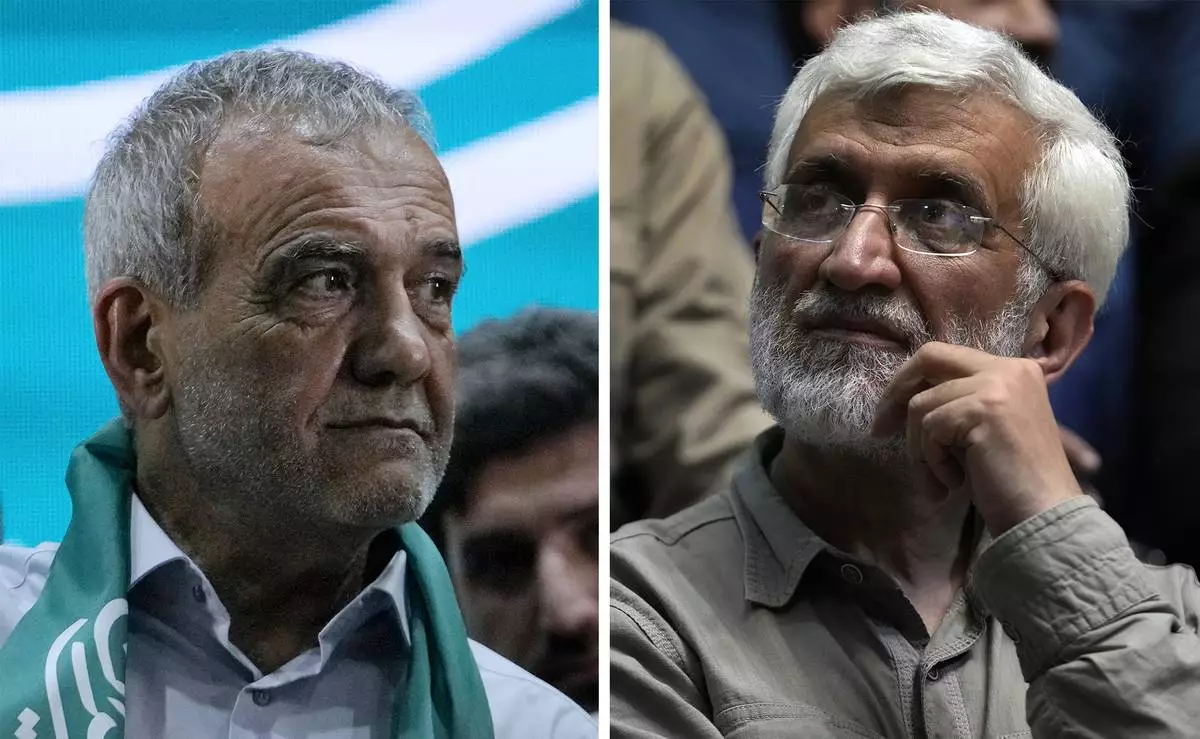
This combination of photos shows Iranian presidential election candidates Masoud Pezeshkian, left, a reformist lawmaker and a former Health Minister, and Saeed Jalili, a hard-line former senior nuclear negotiator, during their campaigns, in Tehran, Iran. (AP Photo/Vahid Salemi, File)








